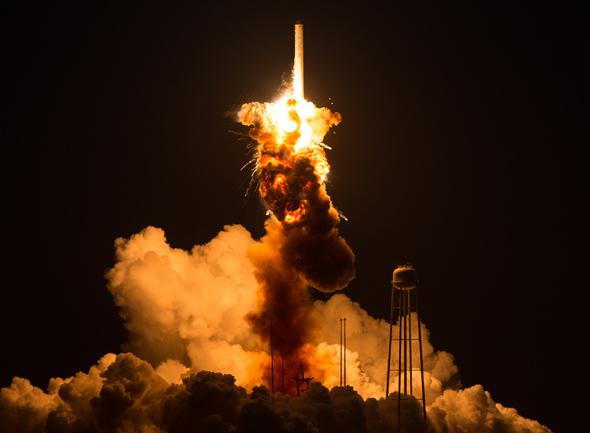On Tuesday night, Oct. 28, 2014, the Orbital Science Corp.’s Antares rocket exploded a few seconds after liftoff. It was supposed to bring supplies—food, hardware, scientific experiments—up to the International Space Station, but a still-unknown malfunction brought it down.
Quickly thereafter video of the explosion started coming in, including a dramatic one shot from the press area, which was a few kilometers removed from the launch site.
Skip Morrow was there, with his wife and young daughter. When I posted about the event, he left a heartfelt comment about his experience there. He has a blog where he expanded on what he said here, and it’s worth a read.
I could just barely see the rocket fall to the ground and immediately exploded. Three seconds after it exploded, the shock wave hit us. It was very, very loud and it really shook the place. Immediately the NASA escorts at the viewing area started yelling for us all to get back on the buses. My daughter started crying, and to be quite honest, I was pretty choked up too.
[…]
Most impressive of all though, were the people offer to help my daughter get through all of this. We reminded her that almost certainly, no one should have been hurt since this was an unmanned mission (of course, we now know that was indeed the case and no one was hurt or killed). We talked to her about how hard space flight is, and how easy we make it look. We talked about how we use incidents like this to help us learn more about how to improve space flight. We even talked about the Launch Abort System used on rockets such as the Soyuz and soon the Orion. She was still pretty devastated, but I know that in another day or two she will be back to normal. She will never forget this, and neither will I.
Commenting on my blog post, he said this:
My daughter took it really hard. She loves coming to these launches, but it never really occurred to her that one of these could turn out bad, like this one. She knows about Challenger and Columbia and Apollo 1, but she hasn’t witnessed anything like this first hand. I really wonder how her opinion about wanting to be an astronaut will change because of this.
I wonder too. I was in college when Challenger exploded, and after the shock wore off, my resolution that we continue to explore space was strengthened, as if honed or tempered by the blast. My love of space and the desire to see us head to the stars runs deep, even when I was still a young child watching on TV as Neil Armstrong walked on the Moon, or seeing Apollo 15 launch in person.
I’ve written dozens of articles on this theme, but now is perhaps the best time to reiterate: Going to space is hard. The levels of engineering needed are staggering, and it all has to go right or else, well, it all goes wrong.
And yet, we still do it. And we’re pretty good at it. Mistakes get made, and then, hopefully, we learn from them. Sometimes it’s a mistake in engineering, sometimes in culture. But the more we do this, the better we get. It’s been a long time since Americans could put people in space—another cultural error—but we’re close to doing so again. And when we do, we’ll start reaching for the stars again.
The good news about this event, such as it is, is that the ISS astronauts are in no danger of running out of supplies; a Russian Soyuz loaded with supplies lifted off successfully just hours after the Antares explosion and docked with the station shortly thereafter. And, of course, there was no one on board the Antares, and no loss of life or even injuries. This failure was a costly one, but it could’ve been far worse.
So Morrow’s daughter is on my mind. I hope she sees this not as a catastrophe, but as a stumble, a misstep, which in the long run is inevitable as we head upward and outward.
Per aspera, ad astra.
